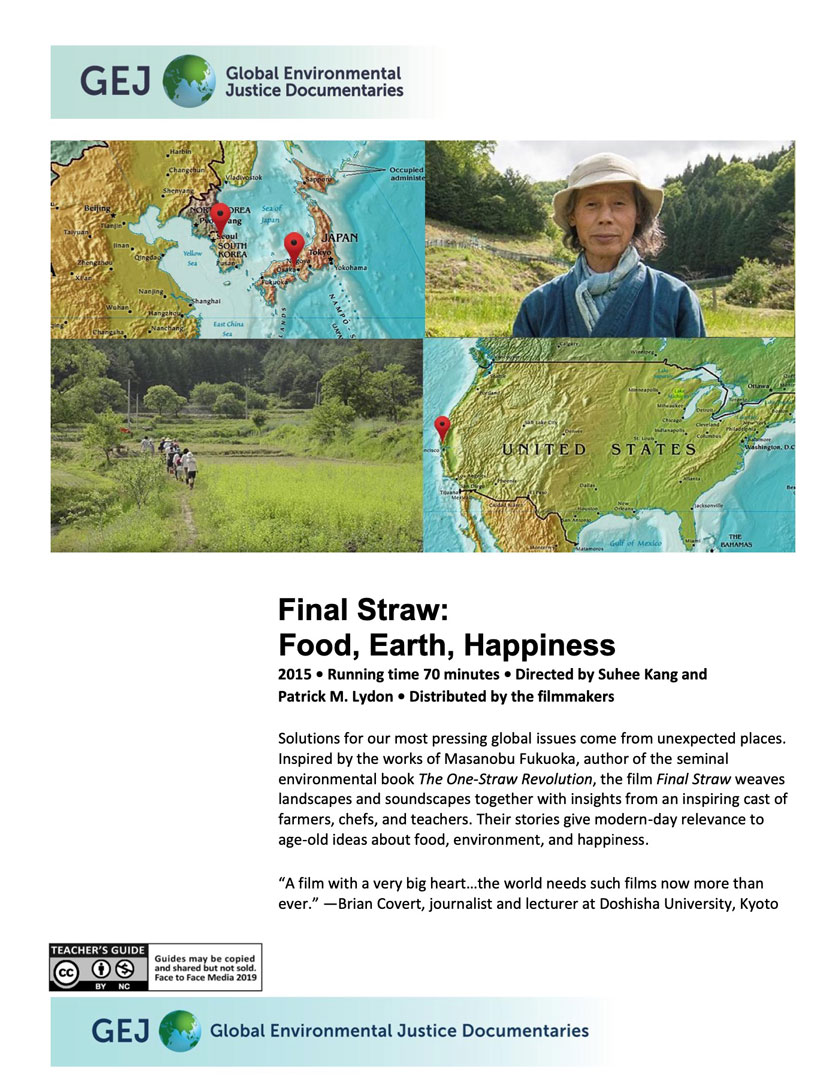Curator
 — Natale Zappia, Associate Professor of History, Director of the Institute for Sustainability, California State University, Northridge
— Natale Zappia, Associate Professor of History, Director of the Institute for Sustainability, California State University, Northridge

Demonstrates that it is possible to rehabilitate large-scale damaged ecosystems, to restore ecosystem functions in… more
Final Straw
For nearly a century, industrial farming has unleashed ecologically destructive ways of growing food across the planet, affecting economies, cultures, health, and biodiversity. This film highlights aspirational but achievable methods to create “natural farms” in this thought-provoking journey through Japan, Korea, and the United States.

Curator
This film was selected by Natale Zappia, Associate Professor of History, Whittier College
Teacher's guide
View the teacher's guide for maps, background information, discussion questions, suggested activities and supplementary resources.
Synopsis
Final Straw: Food, Earth, Happiness is a documentary by directors Patrick Lydon and Suhee Kang. Filmed over a four year period in Japan, Korea and United States, the film finds inspiration in the work of diverse chefs and farmers who have been inspired by the philosophy of the late Masanobu Fukuoka and his seminal book One Straw Revolution which offers what the filmmakers call “a brilliant yet maddeningly simple path to sustainability and well being for people and the environment.”
The film is divided into three sections 1) Modern Life, 2) Foundations and Mindset of Natural Farming, and 3) Natural Farming in Practice and Life
A note from the filmmakers Suhee Kang and Patrick M. Lydon
"During the making of this film, the United Nation’s Food and Agriculture Organization (FAO) released a report which made clear to the world that we only have 60 years of farming left if we continue our ecologically destructive ways of growing food. Add to this, issues of social and economic inequality, resource depletion, and a changing climate that threatens our very existence, and the path forward seems daunting at the least. So where do we go from here?"
"[the film] enables us to catch a glimpse of the people and things which society cannot ordinarily grasp or see... thank you for your beautiful work" – Kim JaeHyung / Korean philosopher and activist
“Wow!! A great film … both art and documentary.” – Alicia Bay Laurel | author of 'Living on the Earth'
“Thought-provoking and inspiring … a powerful call to action” – Clean Eating Magazine
“Meditative, mindful … a beautiful film.” – Barbara Baker / BBC, mindful pie
“Loved it so much … filled with TLC” – Keibo Oiwa / author of 'Slow is Beautiful'
“A film with a very big heart … the world needs such films now more than ever.” – Brian Covert / journalist based in Japan
"The film filled me up with great joy and inspiration...I knew it was going to uplift and give a new perspective to my soul, but I didn't know how deeply it would do those things! I'm going to watch the film today... for the 8th time." – Rafayah Uzzyah, Philadelphia, USA
"[the film] enables us to catch a glimpse of the people and things which society can not ordinarily grasp or see... thank you for your beautiful work" – Kim JaeHyung / Korean philosopher and activist
“Full of beautiful moments and messages that inspired and brought tears to my eyes...” – Rena Komatsu, Tokyo, Japan
Awards
In 2015-2016, the directors undertook a 110-date screening and event tour of Japan and Korea to much celebration. This work included the piloting of a community-based restaurant and garden project called “REALtimeFOOD,” which gained considerable attention and has since been replicated and produced by multiple community and nonprofit organizations.
The film's grassroots popularity doesn't seem to be slowing down. As of 2018, the film has been translated voluntarily by teams of translators around the world into seven languages (English, Korean, Japanese, French, Vietnamese, Chinese, Turkish, with others in progress) and continues to enjoy community screenings and events held regularly around the world.
In March 2018, the directors continue their work by opening “The Branch,” an environmental art and media lab and natural farm in Osaka, Japan that was inspired by their time spent producing Final Straw. They continue to work in collaboration with natural farmers around the world.
Citation
Main credits
Lydon, Patrick (film director)
Lydon, Patrick (film producer)
Lydon, Patrick (director of photography)
Kang, Suhee (film director)
Kang, Suhee (film producer)
Kang, Suhee (director of photography)
Other credits
Animation by Heeyoug Park.
Distributor credits
Patrick M. Lydon and Suhee Kang
Patrick M. Lydon and Suhee Kang
Directed by- Patrick M. Lydon, Suhee Kang
Produced by - SocieCity Films
Written by - Patrick M. Lydon, Suhee Kang, Yoshikazu Kawaguchi, Larry Korn, Kristyn Leach
Music by – WindSync, Bomnoonbyul, Joyful Island, Ippen
Cinematography by – Patrick M. Lydon
Distributed by – Gumroad (International), Kaori Tsuji (Japan)
Docuseek subjects
Agriculture and Food
Asian Studies
Bioregions and Habitat
Asia
Geography
Environmental Science
Agriculture Sector
Citizenship, Social Movements and Activism
Race and Racism
Farming
Agribusiness
Food
Organic and Sustainable Agriculture
Global / International Studies
Environmental Education
Biodiversity
Endangered Species and Extinction
Environmentalists
Health, Healthcare, Medicine and Nursing
Ecology
East Asia
United States
Habitat Restoration
Distributor subjects
Agriculture
Asian Studies
Biodiversity
Biology
Buddhism
Capitalism
Conservation Biology
Consumerism
Ecosystems
Environmental Anthropology
Environmental Education
Environmental Geography
Envronmental Justice
Farming
Food
Habitat Loss
Health and Health Care
Japan
Korea
North American Studies
Pollution
Public Health
Religion
Religion and Ecology
Solutions
Sustainability
United States

